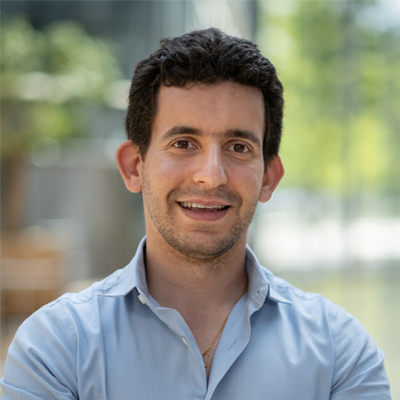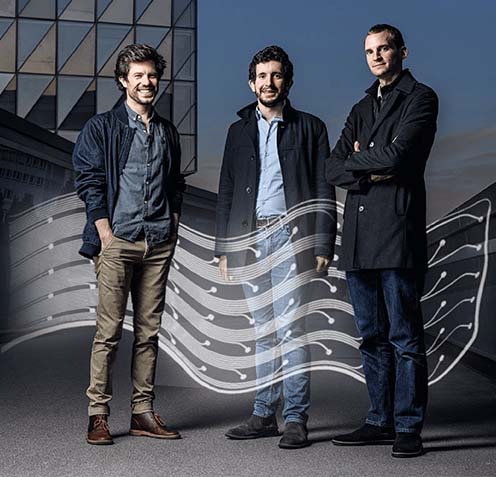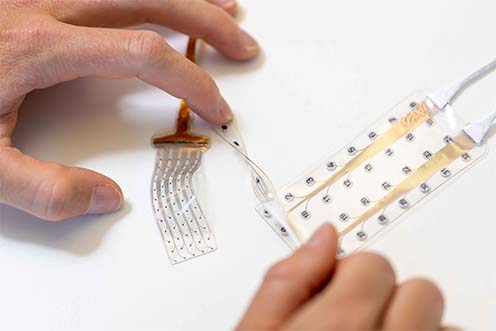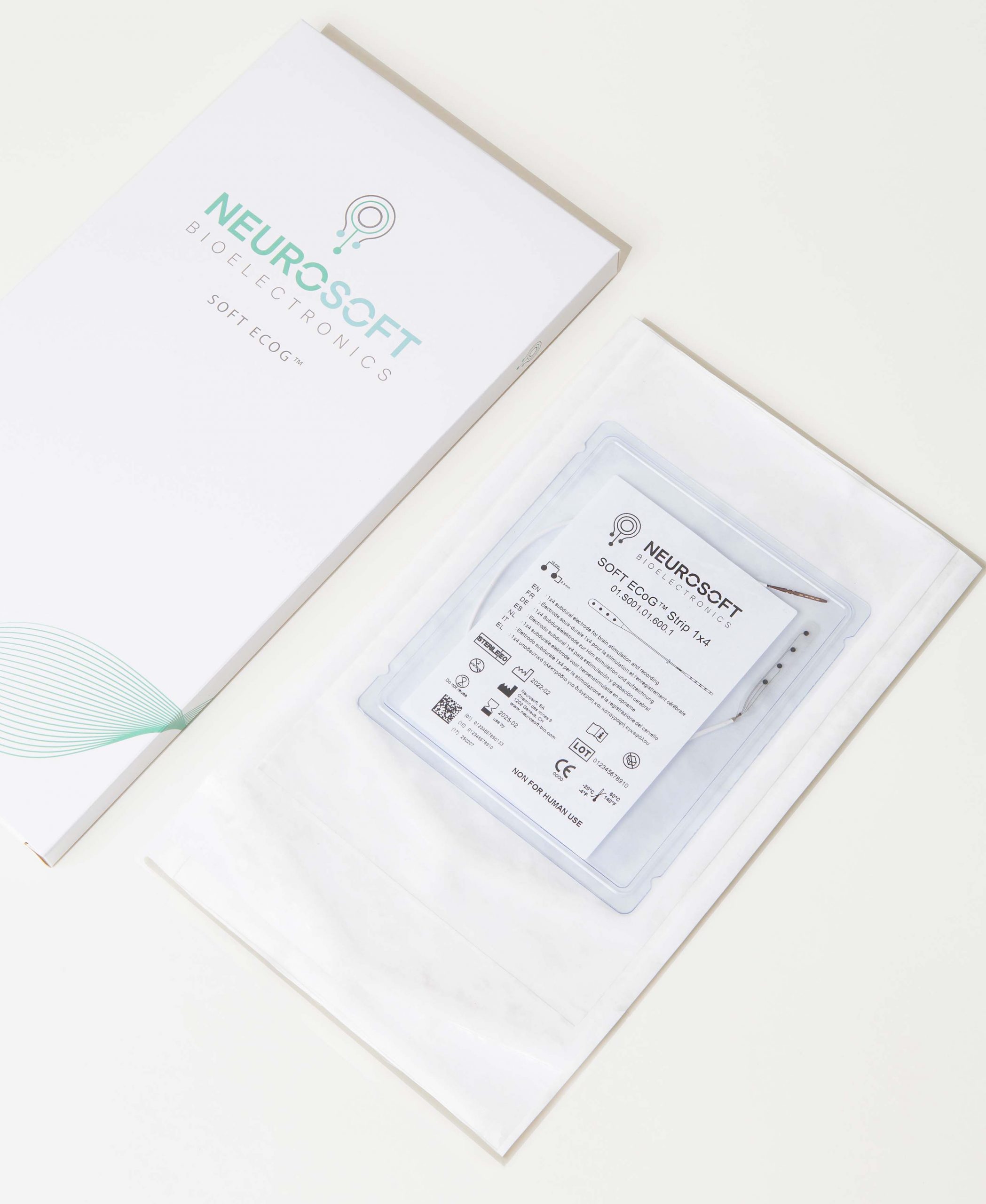Innovation Interview: Neurosoft Bioelectronics and the revolution of neural implants

The MedTech sector always stands out in terms of R&D and innovation as the challenge of improving patients’ treatments is as laudable as essential. This is well illustrated by the success story and pathway of Neurosoft Bioelectronics, a start-up that works in neuroscience. After counting on Swiss national bodies to grow, this start-up has now obtained the financial support of the State Secretariat for Education, Research and Innovation (SERI) to develop its optimized neural implants.
We interviewed its CEO, Nicolas Vachicouras, to learn more about this company’s singularity, which can make a real difference in the sector.

Nicolas Vachicouras, CEO of Neurosoft Bioelectronics.
Your company is “committed to the design and development of better interfaces for the brain and beyond, with the aim of significantly improving the treatment of severe neurological disorders”. Why did you choose this mission, and how were your beginnings?
After finishing my Bachelor’s studies in microengineering at EPFL, I joined the Laboratory for Soft Bioelectronic Interfaces of Prof. Stéphanie Lacour, where I learned about current existing technologies to interface with the nervous system and I was shocked by how outdated current electrode technologies were.
During a summer internship in her lab, I, therefore, started working on novel soft and high-resolution implantable electrodes that could revolutionize the way we interface with the brain and spinal cord using softer materials and higher resolution electrodes. The project was so exciting that I did my PhD on that subject and then decided to start Neurosoft Bioelectronics to bring these technologies from the academic setting to the real world in patients.
We realised how important it is for Neurosoft to count on experts in your advisory board to support your technical and clinical development. Could you please tell us more about this essential part of your team?
The development of implantable neural interfaces is a highly specialized and multi-disciplinary endeavor that requires the expertise of various fields. This is why we try to find the best people to help us with every aspect of our project, including renowned neurosurgeons and neurologists, experts in soft bioelectronics and active implantable medical devices, and advisors from the MedTech industry with a business background or in manufacturing of medical devices.

Neurosoft Bioelectronics’ co-founders, from left to right:
Florian Fallegger, Nicolas Vachicouras and Ludovic Serex.
Your company is based in Switzerland, one of the most innovative countries in the world. According to your experience, why would you say your country is always one of the main global leaders? What conditions do you consider essential to developing an ecosystem like the Swiss one?
Switzerland has an amazing infrastructure and top-notch universities, such as EPFL. These public institutions, as well as the government, have done a great job in promoting innovation and financially supporting high-risk projects like ours.
We have been very grateful for all the government and institutional support we have had so far to work on the company despite all the risks. Moreover, this ecosystem has attracted a lot of people with experience, and we have received a lot of help from advisors and coaches at every step of the journey.
I would say the last part that is still missing compared to the USA is a larger and less risk-averse Venture Capital scene, especially in high-risk domains like medical devices.
Some swiss initiatives such as Venturelab, MassChallenge and VentureKick, have focused their attention on your company, offering you acceleration services and funding. How do you think these institutions can help boost entrepreneurship?
They provide great mentoring and coaching to guide us through the initial steps of the start-up, as well as forcing us to focus more on the business and less on the technology, which, as engineers, we have a large tendency to do. This change of mindset takes time, and I believe that these Swiss initiatives do a great job in fostering that entrepreneurial spirit.
With SOFT ECoG, Neurosoft deepens into the treatment and monitoring of epilepsy. Could you please tell us more about this disruptive technology and its consequent improvement for healthcare systems?
We have introduced a new class of soft and high-density implantable electrodes that seamlessly interface with the brain. Thanks to the unique mechanical properties of our devices, we can promote long-term bio-integration of the devices in the body, reducing surgical and implantation risks and improving recording and stimulation precision.
Our first product, SOFT ECoG, is an electrode that can be used to record from or stimulate the surface of the brain intra-operatively or for an implantation duration of up to 30 days. Such devices are mostly used to monitor drug-resistant epilepsy patients. In this context, we hope to improve the outcomes of epilepsy resection surgery, as well as reduce surgical risks. Another benefit of SOFT ECoG is that the electrodes are MRI compatible and do not generate any artefacts during brain imaging, allowing the neurologist to better observe the tissues which the device is interfacing with.

SOFT ECoG’s project from Neurosoft Bioelectrics.
Talking about this project, the State Secretariat for Education, Research and Innovation (SERI) decided to support it financially through the funding line that replaced the EIC Accelerator (and now can even be considered the predecessor of the ‘Swiss Accelerator’). What benefits do you think these programs give to companies similar to yours?
This program is a great way for us to de-risk the project, in particular those related to technological and regulatory issues, and to make it more attractive to European and Swiss investors, who are typically quite risk-averse and usually prefer to invest in companies whose devices are already on the market.
We know you plan to start commercialising SOFT ECog in Europe and the United States in the next couple of years. Could you please tell us more about your entry into the market and subsequent expansion?
We plan to first bring the SOFT ECoG to the US market, due to the much friendlier regulatory environment with the FDA towards new technologies. Moreover, the reimbursement landscape in the USA, even though complex, is countrywide, unlike Europe’s one. For these reasons, we decided to first focus on FDA clearance.
In a second stage, we will bring the SOFT ECoG to Europe with CE Marking. Even though our regulatory strategy is focused on these two regions, we are also eyeing other regions, such as China, due to their large size and huge volume of patients. In preparation for a future expansion, we also started to deposit patents in this Asian country.

SOFT ECoG packaging.
For our side, it is an honour to meet innovative clients like Neurosoft. Do you consider Evolution eased your path to getting funded? How would you describe our cooperation?
Evolution was of great help in preparing our submission to this program. Indeed, the number of documents and the reporting mechanisms are very long and complex, and we definitely can see the added benefit and time savings.
Moreover, we took advantage of the expertise of Evolution to make sure we focus on and highlight the important and relevant aspects of our business for such grants. Finally, we were quite impressed by how quickly the team members of Evolution understood what we are doing and grasped the essential concepts, even though these can be very technical.
We were quite impressed by how quickly the team members of Evolution understood what we are doing and grasped the essential concepts, even though these can be very technical.
Let’s think about the future. Where do you imagine Neurosoft will be in the following years?
In the future, we hope to be one of the largest neurotech companies in the world. In the upcoming years, we want to leverage our soft electrode technology to expand into other related activities, including active implantable components for recording and stimulation, as well as new software algorithms to process a large amount of data we will be recording from the break.
For that goal, we want to leverage recent innovations in the fields of machine learning and artificial intelligence. Building expertise around these building blocks is going to be a key for pushing us forward on the international scene as a neurotechnology leader.
Thank you, Nicolas, for telling us more about Neurosoft’s inspiring story. We wish you all the best on your journey in pioneering neural implants!

